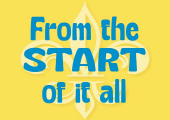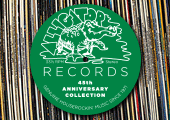DON BRYANT
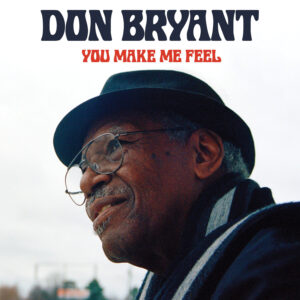 You Make Me Feel
You Make Me Feel
Fat Possum – FP1747-3
Pressing the play button on a CD player with Don Bryant’s You Make Me Feel is like activating a time machine that takes the listener back to the early 1970s heyday of Memphis soul music in studios like Stax and particularly Hi Records. Of course, Bryant was part of the team that so successfully shaped that Hi Records sound. He recorded some hits, but essentially focused on the role of songwriter, especially for his wife, singer Ann Peebles, with whom he co-wrote the smash hit I Can’t Stand the Rain. During the 1980s and 1990s, Bryant turned his focus to gospel music, but in 2017, he triumphantly returned to vintage-sounding Memphis R&B with the Don’t Give Up on Love, a collaboration with the Bo-Keys.
This time around, Bryant has teamed up with producer and multi-instrumentalist Scott Bomar and coaxed former Hi session drummers Charles Hodges and Howard Grimes and keyboard player Archie “Hubbie” Turner back into the studio. The results are absolutely stunning. Bryant is pushing age 80, and the distinctive sound of his voice and his ability to hit the notes he’s looking for is undiminished. His songwriting skills are also sharp. The ten-song program features four new songs he’s co-written with Bomar; he also revisits some of his past compositions that were hits and revises a classic from his gospel years. The premium he has always placed on imbuing his songwriting craft with a storyteller’s penchant for emotion and detail is on display on the new songs, and anyone not familiar with his life’s work would be hard-pressed to distinguish the old from the new.
The program kicks off with the title track’s horn fanfare, and it’s quite apparent when his soulful, husky voice sings the opening lines of this new tune that funky R&B is what’s on the menu. The other new compositions include the simmering blues ballad Is It Over, which features surging horns and subtle string section accents; Your Love Is Too Late displays an urgent driving groove; and A Woman’s Touch is another outstanding ballad drenched in blue emotion and elevated by a vocal chorus and surging horns.
The vintage material includes the steamrolling soul of 99 Pounds, a hit he wrote for Peebles in 1971; I Die a Little Each Day, the gospel-influenced, mid-tempo ballad he wrote for Otis Clay in 1977; Don’t Turn Your Back on Me, a stripped-down, slowed-down recasting of the mournful original; I’ll Go Crazy, a remake of his 1968 B-side ballad; and Cracked Up Over You, a cover of Danny White’s funky up-tempo 1966 recording. Bryant concludes by taking things back to church with the rousing version of Walk All Over God’s Heaven. You Make Me Feel is first-rate from start to finish, and even though Don Bryant has revived the glory days of the Memphis soul sound, the music remains vibrant and compelling.
—Robert H. Cataliotti
CRYSTAL THOMAS
 Now Dig This!
Now Dig This!
Dialtone – DT1002
The outstanding vocalist Crystal Thomas made her Dialtone Records debut on three tracks of a 2018 compilation CD by Bloodest Saxophone, followed by a 45 r.p.m. single issued under her own name. Now she’s back with her first full-length album for the Austin-based label, and it’s a dynamic recording, grandly fulfilling the promise hinted at by her previous collaborations with producer Eddie Stout. Throughout the astutely curated set list, the Louisiana-born Thomas sings with fiery confidence and impressive voice, backed by a stellar band assembled for the sessions. To top it off, this exquisite monophonic recording arrives on 180-gram vinyl, encased within a cover that evokes the look of mid-20th century jazz LPs. Now dig this, indeed!
Nine of the ten tracks highlight Thomas’ superb interpretation of songs; the other, titled Blues Funk, showcases her chops as a trombonist (who previously worked in the late Johnnie Taylor’s horn section). Recorded at Audio Dallas studio, the album is noteworthy for the high level of talent represented by the supporting players. On organ and piano, plus one unforgettable vocal duet, is the great blues performer Lucky Peterson, who passed away not long after collaborating prominently on this project. On bass is Chuck Rainey, a distinguished veteran sideman who previously recorded with big names such as Aretha Franklin, Louis Armstrong, Etta James, and James Brown, to mention only a few. With well over 100 years of big-time professional experience between them, these two renowned virtuosos join forces with a couple of aces from the Austin music scene, the Moeller Brothers. On guitar, there’s the soulful six-string stylist Johnny Moeller, a member of the Fabulous Thunderbirds. Meanwhile, Jason Moeller—who rhythmically graced previous Dialtone albums by Little Joe Washington, Milton Hopkins & Jewel Brown, and others—more than capably mans the drums. This foursome fuses into a marvelous music machine that Thomas is fortunate to drive. Backed by such a savvy ensemble, she not only delivers but dazzles.
The set commences with I’m a Fool for You Baby, a hard-charging track on which the rapport is gloriously conspicuous, imparting the feel of a live gig. Thomas belts out the vocals with authority, deftly calling for solos on drums, piano, and guitar. Later, on I Don’t Worry Myself, she spontaneously coos “C’mon y’all!” as the band churns a funky groove. Take Yo’ Praise is a testifying love song in which she dramatically shifts in the final verses from singing to speaking. On the mournful soul ballad Ghost of Myself Thomas seems to channel Aretha Franklin—a comparison supported by a quote from Rainey in the accompanying notes. Likewise, overflowing with anguished longing, Thomas fully inhabits the sassy sway of Janis Joplin’s One Good Man. Equally effective is her rousing run through the southern soul classic No Cure for the Blues. On the Albert King composition Can’t You See What You’re Doing to Me, Peterson’s up-in-the-mix organ becomes a spellbinding second voice responding to the singer. In fact, Peterson’s genius on keyboards permeates the whole set with powerfully sustained chords, effervescent flourishes, and often thrilling mid-song solos—as holds especially true on The Blues Ain’t Nothing but Some Pain, a poignant heart ballad of despair. Furthermore, on Let’s Go Get Stoned, Peterson and Thomas actually do vocalize together, splendidly swapping verses in the spirit of Ashford & Simpson while vigorously joining voices on the chorus—a fitting finale for the set.
Still in her early 40s, Thomas may well go on to make other fine albums. But given Peterson’s untimely death and Rainey’s recent retirement, she will never do so again with this particular team of first-rate musicians, each seemingly in sync with her every expression. That fact makes this wonderful new recording even more precious, a contemporary blues treasure.
—Roger Wood
SELWYN BIRCHWOOD
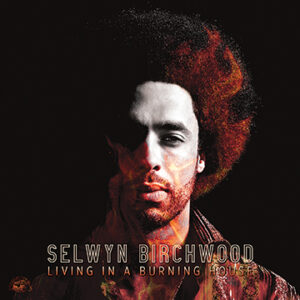
Living in a Burning House
Alligator Records – ALCD 4999
Even before the shrink wrap is off Selwyn Birchwood’s third album, it’s telegraphed that the package represents a more serious offering than what has come before. From its title to the photo of the steely-eyed guitarist, Living in a Burning House establishes a vibe miles away from the youthful, smiling Birchwood of his 2014 major-label debut, Don’t Call No Ambulance, and the playful cartoon cover of 2017’s Pick Your Poison.
Birchwood was no slouch when he first appeared on the scene. Bringing influences from outside the blues idiom, the Florida guitarist played with funky fire. But years of touring and recording have served to sharpen and refine his attack. More than “just” an incendiary electric guitarist, Birchwood is a songwriter; as has been his practice from the start, he wrote all his own material on Living in a Burning House.
Backed by a core four-piece band that includes longtime collaborators horn player Regi Oliver and bassist Donald “Huff” Wright, Birchwood alternates between rhythm, conventional lead, and lap steel guitar. And he changes up the vibe in a near-constant shifting of tone. He explodes out of the gate with I’d Climb Mountains, rocks hard on the playful I Got Drunk, Laid and Stoned, and combines funk and subtle reggae touches on the album’s title track.
The songs are solid, connected to the blues tradition but never constrained by it. Birchwood’s approach seems to be to use the blues idiom as a springboard from which to launch his tunes, but his early immersion in rock lends a widescreen accessibility to his work.
Still, there’s little about Selwyn Birchwood’s style that will put off the more purist-leaning blues aficionados. His playing displays an understanding of the skill-meets-showmanship of legendary players like Buddy Guy, and a winking, cocksure sense of humor pervades his lyrical approach. To wit on the latter: You Can’t Steal My Shine features Birchwood declaring, “You can steal my wife, and I’ll wish the best to ya both.”
Most of Birchwood’s lyrics adopt a first-person perspective. Thematically, the songs explore a range of emotions (Rock Bottom, My Happy Place) and life experiences (Revelation, Searching for My Tribe, Mama Knows Best) that wouldn’t be nearly as credible had they come from Birchwood a decade earlier.
But it’s possible to listen past the lyrics and focus on the music. And doing that is richly rewarded: a highlight of the rock-solid band is Oliver’s horn work. Layering multiple instruments—baritone, tenor and alto saxophones, piccolo flute—he’s a rich and soulful one-man horn section.
The album is full of subtle touches like the insistent (yet never overpowering nor distracting) wah-wah pedal work that enlivens Searching for My Tribe. And She’s a Dime works a New Orleans vibe into a tune reminiscent of the Temptations’ 1964 hit The Way You Do the Things You Do. Elsewhere, Birchwood’s glockenspiel adds wonderful, understated texture to the soaring One More Time.
Now a decade into his recording career, with Living in a Burning House, the 35-year-old guitarist may have made his most fully realized artistic statement to date. But it’s clear, too, that in many ways he’s just getting started.
—Bill Kopp
ALABAMA SLIM
T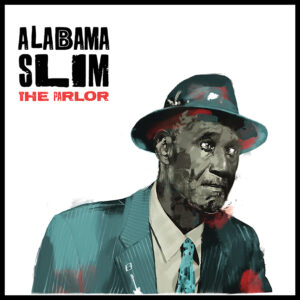 he Parlor
he Parlor
Cornelius Chapel – CCR54
When key rock musicians acknowledged their debt to blues figures in the 1960s, many of those bluesmen found themselves with a new and younger audience. Their belated wider recognition came just in time, as many were well into their middle years or beyond. Now, a half century later, most of the blues giants have long since left this world. Current-day genuine exponents of real-deal blues are rightly admired, but every once in a while, an artist surfaces seemingly fully formed, causing listeners to wonder where they have been all this time. It’s especially extraordinary when those musicians are into their later years when they’re first “discovered.”
Alabama Slim (born Milton Frazier) is already into his 80s. His first release, 2007’s The Mighty Flood, was released by the Music Maker Relief Foundation. He was featured on the label’s Blue Muse compilation in 2019, and in a companion book of the same name. His latest release, The Parlor, is a loping, laid-back set that recalls John Lee Hooker in its character and musical approach.
With a spare ensemble—bassist Matt Patton (Drive-By Truckers), drummer Ardie Dean, Squirrel Nut Zippers founder Jimbo Mathus on piano and organ, plus guitarist Little Freddie King—Slim brings a spontaneous, extemporaneous feel to the ten tracks on The Parlor. That feel is a result of the manner in which the record was made: a four-hour session featuring Slim, King, and Dean yielded the basic tracks, and a later overdub session by Mathus and Patton added subtle touches of bass and keyboards; their work enhances—but never competes with or overshadows—the guitars and vocals.
Rock with Me Momma is a representative track. While it may recall any number of classic blues sides, one gets the sense that Slim wouldn’t sing or play the song the same way twice. The interplay between King and Slim never feels forced; The Parlor isn’t a cutting session. The two spin out complementary melodic lines on their electric guitars, and the end result feels like a conversation. The two guitarists might “talk” over each other at times, but there’s a warm, friendly and comfortable feeling that makes plain that there’s plenty of space for both to put their messages across.
As appealing as Slim’s singing voice can be, the most intriguing cut on The Parlor is Forty Jive. More spoken than sung, the tune is an acerbic commentary on a certain television personality whose exit from the world stage can’t come soon enough for Slim: “What a party when the righteous take him down / Undertaker, you’ll have to screw him into the ground.”
That sociopolitical piece aside, most of The Parlor concerns itself with more traditional subject matter. The titles tell the story: Hot Foot, All Night Long, Someday Baby, and so on. The live-in-the-studio approach employed by the album’s producers (drummer Dean with Music Maker Relief Foundation’s Tim and Denise Duffy) strikes just the right tone; The Parlor, recorded pre-pandemic, is a timeless collection.
—Bill Kopp
STEVE CROPPER
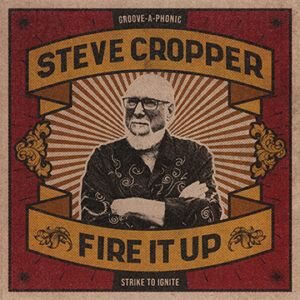 Fire It Up
Fire It Up
Mascot/Provogue – PRD – 76341
What a treat it is to have a new solo album from the great Steve Cropper. The legendary guitarist gave us, of course, some of our most memorable music as a songwriter, guitarist, and producer at Stax Records: (Sittin’ on) The Dock of the Bay, Midnight Hour, Soul Man, Hold on I’m Coming, among many others. Cropper’s magical rhythm guitar steers the songs, providing a sure, soulful foundation, and his lead riffs are clean, crisp, and just right, adding fullness and dimension to the songs without dominating the song. On his new album, his first solo album since 1969, Cropper’s playing in the service of the songs, and we’re all the richer for his tasty chords and licks.
The album opens and closes with the two-part funk instrumental Bush Hog, and Cropper’s propulsive guitar mimics the action of the machine of the same name. Like a bush hog, which clears away underbrush with its chewing, mowing motions, the song clears a path for the rest of the album with powerful chops and a sonic page out the Allman Brothers’ Stand Back. The title track rides along a smooth soul groove, powered by Roger C. Reale’s gritty vocals, while the slow soul ballad One Good Turn floats along a sea of horns, punctuated by Cropper’s never-waste-a-note tasty lead on the instrumental bridge. One Good Turn is a classic soul song in which the vocals and instruments create a moment of perfection that takes us to another place when we listen to it. Out of Love funks and strolls along Cropper’s lead lines, blaring horns, and Reale’s growling vocals, while Say You Don’t Know Me jauntily bops along producer Jon Tiven’s keys, pushing horns, and Reale’s vocals with a phrasing that recalls Joe South’s Walk a Mile in My Shoes. The Go-Getter Is Gone is classic Memphis soul; it’s a robust song in which the instruments and vocals circle higher and higher around each other to produce a jet-fueled soul funk.
Fire It Up is a gift from Cropper; he showcases what he’s always done best: he writes and plays, creating classic sounds and unforgettable guitar riffs along the way.
—Henry L. Carrigan Jr.
ANDY COHEN
with Moira Meltzer-Cohen
 Small but Mighty: Songs for Growing People
Small but Mighty: Songs for Growing People
Earwig – CD-4977
Small but Mighty: Songs for Growing People is the latest in a long line of cherished releases from Andy Cohen (joined here by daughter Moira Meltzer-Cohen), an authority on the many musical forms that define the American South. Although the cover art, album title, and some of the songs’ titles directly market the album to children, this record was also crafted to be enjoyed by a broader audience.
Anyone who has followed Cohen throughout the decades since his recording career began in the 1970s will appreciate the incredible artistry and attention to detail on display here. With all but one of the baker’s dozen tracks falling under the two-and-a-half-minute mark, Small but Mighty is perfect for intermittent listening sessions (or a little one’s short attention span) and offers a survey of the styles and instruments Cohen has devoted a lifetime of study to master.
One of those, the banjo, is a featured instrument on three original tunes, an old timey instrumental The Brand New Baby, the sweet tooth–friendly Funnel Cakes, and a humorous Uncle Stinky that relates the tale of a poor Spam-eating chap who’s inexplicably proud of the fact that his feet emit a particular, well, odor. Talkin’ Casey, an album highlight, is a beautiful and at times poignant talking blues, with Cohen expertly imitating the sound of a steam train on his National steel slide guitar. Meltzer-Cohen’s sweet harmonies and lead vocals add additional texture to this timeless collection.
In a nice nod to Blind Arthur Blake, Cohen improvises a delightful verbal riff in his take on Blake’s ragtime West Coast Blues: “Look at old grandma, she’s over in the corner, she’s shaking that jelly just like she used to do 99 years ago—look at that jelly go!” Wesley Gatchet, LB’s resident second grade contributing writer, particularly enjoyed this number, adding with a big grin, “Ninety-nine years old? Jeez, grandma, you can still do that?”
It’s great to see Cohen delivering material of this nuance and quality in a way that resonates with younger listeners (“trust me, they get them,” Cohen writes in the liner notes). If my seven-year-old co-reviewer’s reaction is any indication, then your little ones—not to mention you, and especially grandma—will enjoy this album, too.
—Roger Gatchet and Wesley Gatchet
ERWIN HELFER AND THE CHICAGO BOOGIE ENSEMBLE
 Celebrate the Journey
Celebrate the Journey
The Sirens – SR-5028
At 85, Erwin Helfer remains the staunchest and most dedicated exponent of the venerable Chicago boogie-woogie piano tradition. Mentored by some of the greats including Cripple Clarence Lofton, Little Brother Montgomery, Sunnyland Slim, Jimmy Walker, and Blind John Davis (as well as vocalist Estelle “Mama” Yancey, widow of the legendary Jimmy Yancey, with whom he worked for many years), Helfer carries the torch they handed down to him with unfailing elegance and grace, as well as a buoyant enthusiasm that might challenge that of a man 65 years his junior.
He’s joined here by some of the Windy City’s most redoubtable sidemen, and the result is a characteristic Helfer excursion into a blues-enriched landscape of musical eloquence and playfully gritty uplift, deepened by a feel of hard-earned, sweet nostalgia. Offerings include three Helfer originals along with a few standards, as well as a casually hip remake of Sonny Rollins’ Doxy. Tenor saxophonists Skinny Williams and John Brumbach aren’t quite the bebop firebrands Rollins was in his prime, but he digs deeply into the bluesy heart of the song as Helfer, bassist Lou Marini, and drummer Davide Ilardi swing with low-key but unerringly focused ease.
Doxy sets the tone—this isn’t a showcase for egotistical displays, but rather a celebration of musical blood-brotherhood. Songs like Down By the Riverside and Alexander’s Ragtime Band, as travestied as they’ve been over the years by funny-hat pseudo-“Dixieland” abominations, are resurrected here and reinfused with their original, unselfconscious celebratory brio. Helfer’s own creations, such as Pooch Piddle (on which the influence of New Orleans masters like Tuts Washington, Professor Longhair, and Archibald—whose work Helfer studied during his early tenure in the Crescent City—makes itself joyfully apparent) and the richly elegiac Day Dreaming invite us into the heart and soul of one of blues piano’s most eloquent practitioners—meaning that they also invite us to honor the spirits of the ancestors whose legacies and gifts Helfer celebrates every time he sits at a keyboard.
—David Whiteis
RYAN PERRY
 High Risk, Low Reward
High Risk, Low Reward
Ruf Records – RUF 1278
Guitarist Ryan Perry’s recent release on Ruf Records, High Risk, Low Reward, finds Perry unveiling a series of confessional compositions that give listeners a real opportunity to get closer to his soul. A well-crafted batch of tunes that feature intense lyrics, awesome solos, and well-executed arrangements by the band makes this new album an attention-grabber that will easily satisfy both critics and fans alike.
Ain’t Afraid to Eat Alone is a seriously soulful medium-tempo groove where he takes two choruses of hot lead guitar solos upfront to let you know he ain’t just funkin’ around. Singing in his low register, he sounds sinister about “’nother man walking in my worl’, talkin’ to my girl” and says confidently that he’s okay flying solo if she’s stepping out on him—he knows what he’s worth.
In similar feel, he follows up with Homesick: “That song about me wanting to leave home—the state, or the woman, you decide—so bad. But then realizing I had everything I wanted back home, and wanting to come back.” The bridge modulation to the minor key is a sweet surprise, with a perky, popping solo and smooth background vocal harmonies by Jeffrey Staten and Stefanie Bechtold.
Pride is a confessional statement in a minor key that is laid back but maintains a steady gallop. According to Perry, it’s “me acknowledging my prideful (and sometimes toxic) ways and hoping I can change them before the one I love leaves me.” The reverb-laden solo with tremolo adds a nice touch (and I could swear I heard a direct quote of Gene Wilder’s Pure Imagination on the fade-out of his solo!).
A Heart I Didn’t Break is about “loving yourself before you can love another, something I have only a slight grasp on at this point in my life.” His clean, Robert Cray–ish tone on this one is refreshing. Why I Sing the Blues is the tribute to B.B. King’s classic boogie, with Ryan using an octave pedal to deliver clean lyrical phrases. Perry really pays homage to King smartly—by playing it straight vocally and keeping the song true to form, where others might have mistakenly tried too hard to dress things up.
One Thing’s for Certain has great lyrics with a surefire snappy groove, but downshifts to a snake-like crawl, while he purrs over the lazy pace with carefully chosen blues licks to close out the piece. Meanwhile, the title track, High Risk, Low Reward, is sung low in register, but high in swagger. He’s got a Hooker-like repetitive riff as he delivers revealing lyrics about “investing too much into someone who gives too little in return.” The dirty solo at the end is surely inspired by “the Healer” himself. Also fitting this description is Hard Times, which is even grittier with bassist Roger Inniss and drummer Lucy Piper stompin’ the blues on every beat.
Changing Blues is a beautiful change of pace, built on only one chord—the open E minor. The bass line serves as a mantra as Perry ponders this issue: “the blues has changed in the past 20 years—what will it sound like in 20 more?”
Oh No is a slow burner that features lead guitar lines that makes you really appreciate Ryan’s ability to build a guitar solo over a low flame and gradually raise the temperature to a high boil. And his tone is so clean yet dirty. Evil Is Going On is an incredible take on Willie Dixon’s 1954 Chess classic performed by Howlin’ Wolf. In Perry’s version, just imagine Led Zeppelin and Robert Plant entering the room and hijacking the band. You just gotta hear this one—it’s really fresh!
Recorded in Berlin at Studio Erde with Innis as producer, Perry delivers almost an hour of blues at its finest—a first-rate album that makes all others immediately sit up and take notice.
—Wayne Goins
CATFISH KEITH
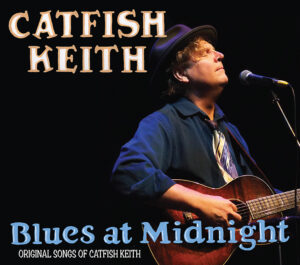 Blues at Midnight
Blues at Midnight
Fish Tail Records – FTRCD018
The sharp-dressed Iowa bluesman Catfish Keith is at it again. This time with original songs written over his 40-year-long career as a singer/songwriter and guitarist. Fans will rejoice that he has stayed true to his essential style and approach over decades, delivering the comfort of familiarity, while critics may point to the distinct similarity of his albums. Certainly, all would agree that he is consistent. Why should he change, after all? He is successful and widely loved all over the world. When it comes to instrumental prowess, he is a superb fingerpicker and an extraordinary slide guitar player, lively and bombastic, filled with fiery energy. His live shows are joyous and fun, theatrical and, yeah, if you know a wild blues act, the Catfish is even wilder than that.
The Catfish can play. As a guitar instrumentalist he is in the major leagues, having mastered a wide range of styles and tunings. He is a virtuosic guitarist’s guitarist who stunningly delivers the full range of 1930s-era country blues. On any one of these tunes, he performs fancy alternating bass fingerpicking or chiming slide glissandos on the resophonic guitars. Gear heads, sure to be a bit jealous, will love the listing of the 13 guitars he used on this album on each song, including from sponsors National, Santa Cruz, Fairbanks, Bown, and Fraulini. The number 13 comes up again: 13 songs, 13 guitars, 13 Grammy nominations, but the numerology chain breaks as this is his 19th album release.
You will instantly recognize Catfish Keith by his trademark snazzy fedoras and unmistakable ear-to-ear grin. He truly loves to play and still has immeasurable fun, an exuberance that infects this album with unbridled merrymaking. Take his sweet instrumental West Indian Waltz, the perfect resophonic ditty. Move to Louisiana is another fingerpicking gem, derivate of numerous predecessor songs most blues fans will recognize, featuring fiddler Randy Sabien. Oh, Mr. Catfish is a raucous duet with harmonica ace Peter “Madcat” Ruth with a real Muddy or Howlin’ Wolf feel. He lets the harmonics chime on the 1998 National Radiotone Bendaway Jumpin’ Jack Rabbit. Weep Like a Willow, played on the National Baritone Tricone, is one of the highlights of the album, and the title cut, Blues at Midnight, gets deep in the essence of the acoustic blues.
Catfish Keith put his mark on the acoustic blues as one of today’s foremost preservationists. If time travel could take him back to the 1930s, to have a chance for the greats of that era to hear him play, he would surely raise some eyebrows. The Catfish is the real deal, truly fierce. This new album again proves it.
—Frank Matheis
DEVIN B. THOMPSON
 Tales of the Soul
Tales of the Soul
Severn – CD 0078
Vocalist Devin Thompson started out as a trumpet player in the area around Joliet, Illinois (about 50 miles southwest of Chicago). Inspired by vocalist Willie Newsome (who recorded under various names, including Frankie Newsome and Little Willie Parker, in the 1960s and ’70s), he gravitated toward singing; he and Newsome eventually worked together on the club and show lounge circuit around Chicago. After Newsome landed a spot on a Northern Soul festival in Manchester, England, in 2015, Thompson contacted the Severn label with the intention of garnering a recording contract for his old mentor. As it turned out, Severn ended up equally impressed with Thompson’s vocal abilities and decided to record him, as well. This disc is the result. (Newsome died in 2019, at the age of 75.)
As might be expected from an artist of Thompson’s age and musical pedigree, this is a resolutely old-school soul outing. Offerings from the catalogues of Bobby “Blue” Bland (Love to See You Smile), Little Milton (I’m Gonna Cry a River), and Joe Simon (Something You Can Do Today) share the set list with eight Thompson originals. Thompson’s vocal delivery is a little rough around the edges, but it’s rich with emotional power. There may not be much he can add to material most listeners will associate with master stylists like Bland, Milton, and Simon (although pianist Kevin Anker and the rest of the band’s meditative, nightclubby accompaniment on Something You Can Do is especially notable), but on his own material he sounds quite convincing. He rides the light funk groove of songs like Get Home Tonight and Back Together with vintage hipster elan (there are strong echoes of the ’70s-era Willie Mitchell sound in the arrangements, to say nothing of Thompson’s own Al Green–tinged vocals). Thompson gets effectively churchy on the ballad Time After Time (no relation to the 1983 Cyndi Lauper hit); on the set’s closer, Tell Me, a hard-eyed call out of racism and social inequality, both the production and Thompson’s vocals are appropriately toughened up.
It’s good to see a long underrecognized veteran like Devin B. Thompson finally get at least a sliver of what he’s due. Now let’s hope things change for the better so he can finally hit the road and share his gifts with a wider audience.
—David Whiteis











